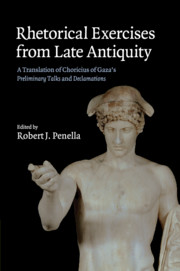 Rhetorical Exercises from Late Antiquity
Rhetorical Exercises from Late Antiquity Epilogue: The fortune and reception of Choricius and of his works
Published online by Cambridge University Press: 29 January 2010
Summary
Unlike various well-known late ancient colleagues of his, Choricius never speaks in his works of the success he had either as a public orator or as a professor of rhetoric, nor does he give us any information about the circulation of his compositions. This makes it somewhat difficult to reconstruct the fortune and reception of his works among his contemporaries, given also the complete absence of his name from epistolary collections of his times, particularly from that of his teacher Procopius of Gaza, who strangely never mentions his pupil in his own letters.
Yet the probably prestigious role that Choricius played as Procopius' successor in the educational and administrative leadership of the local school of rhetoric, as well as his connections with important contemporary representatives of the church and the imperial throne, provide indirect evidence for the significance of his rhetorical and scholastic activity and of the success that followed upon it in the daily life of Gaza. His prominence is proved by the names of the people at whom his public rhetorical efforts were aimed: the bishop Marcianus; the dux Aratius and the archōn Stephanus; the general Summus; Maria, sister of Aeneas, bishop of Gaza, and mother of Marcianus; and the emperor Justinian.
So it is easy to conjecture that the allure of Choricius' learning – the learning of this man who was soon counted among the best and model rhetors – won followers from among the students who sat in his classroom, and that perhaps even some of his literary and academic colleagues were affected by it.
- Type
- Chapter
- Information
- Rhetorical Exercises from Late AntiquityA Translation of Choricius of Gaza's Preliminary Talks and Declamations, pp. 261 - 302Publisher: Cambridge University PressPrint publication year: 2009
- 1
- Cited by


